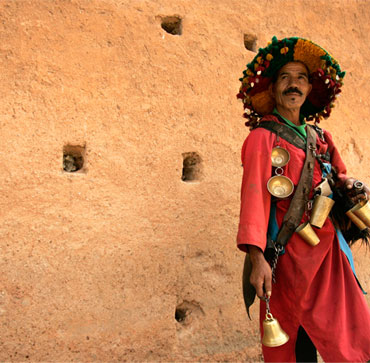
Romantic landscapes. Enchanting souks. Affable people. Bollywood. In a special series, Arthur J Pais takes a magical, mystery tour of Morocco.
As he adds a few fresh mint leaves to my teapot, Rachid Hadji, a Tangier student doubling as a tourist guide, asks me what the common historical factor between Tangier and Bombay was. "It was a long time ago," he says. "In the 17th century."
"Tell me," I ask after a few minutes of dipping into colonial history. "I can't think of anything."
"Dowry," he says, grinning.
"Dowry? Did someone in India marry a Moroccan with a lot of dowry?"
He laughs. "Dowry, and I may also say, tea."
Waiting a couple of minutes, he explains how Tangier, like Mumbai, was a Portuguese colony. And both were given to the British as dowry for Portuguese queen Catherine Braganza who married British king Charles II.
"And the British also introduced tea from India and China [here]," he said. "We were and still are happy with our mint tea but the tea with caffeine is rather new to us We have had it for just about three centuries."
I could think of another Indian-Moroccan connection
I remembered a conversation I had with Moktar, a Moroccan working at a Dunkin Donut franchise near my home in Harrison, New Jersey.
"A very old man from my country has visited India," he once told me.
"How old was he?" I had asked.
Moktar, who has limited English, said, "I think he was 700 years old."
I knew he was referring to Ibn Battuta, one of the most intrepid travellers the world has known, who travelled across the Islamic world and then in China and India in the 17th century.
Dozens of streets are named after him in big and small cities across Morocco.
Abu Abdullah Muhammad Ibn Abdullah Al Lawati Al Tanji Ibn Battuta was a scholar and traveller, still remembered for the account of his travels Rihla (voyage in Arabic). His journeys lasted nearly thirty years and according to conservative estimates spread across 75,000 miles.
"We believe anyone coming to Morocco pays a tribute to Ibn Batuta," Moktar said. "You should go to Morocco. Small country but lot to see, even if you will have language difficulties."
Most Moroccans speak Berber in their homes, a language with its own script, but everyone except in remote areas speaks the official language, Arabic.
"The rulers were always Arab-speaking," says Rachid. "So we accepted it. The French colonists ruled us for over 100 years and we kept their language too. It is also an official language in Morocco."
For a country that can be travelled from north to south in about 16 hours, and east to west in about 10 hours, Morocco offers a cornucopia of fun and memorable experiences.
Movie-buffs, admirers of novelists Paul Bowles and William Burroughs, history buffs, nature lovers, rock climbers, beach lovers and those in search of exotica will find Morocco one of the most fascinating and affordable countries in the world. Two people can comfortably travel on a budget of $150 (approximately Rs 6,700) a day in this Muslim country where religion is confined to homes and mosques.
"We pray, we fast, and we enjoy life," said a university student in Fez. "But we do everything here in moderation."
For those who love trekking there are the Atlas mountains, offering summer walks and winter mountaineering. Birdwatchers will have an engaging time in the Atlas mountain region watching bee-eaters, falcons and hundreds of other exotic birds.
If you are looking for unusual hotels, the old mansions converted into riads cannot be recommended enough. With a courtyard and garden in the centre of the mansion, these hotels often offer rooms for just about $100 (approximately Rs 4,500) for two.
Many kasbahs the traditional mud fortifications have been turned into atmospheric hotels in many pockets of the country as well.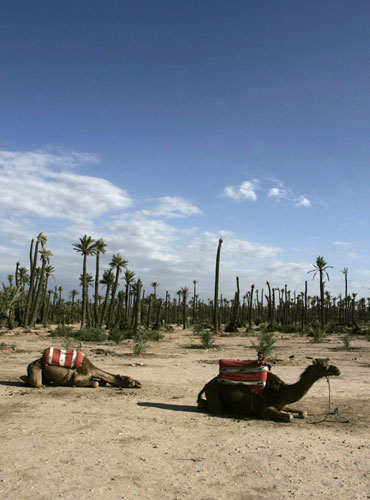
In the southern oasis towns, you will not only find a lot of greenery but also opportunities for camel rides. Some rides last just about two hours, over the dunes to see the spectacular sunset or sunrise.
Some can take at least three days where you will sleep in the tent in the Sahara and sub-Sahara deserts. The journey, not recommended to those with weak legs and delicate constitutions, is not continuous. Every third hour or so, you get off the camel and rest for an hour. Even then, tour operators discourage those above 40 from taking it up.
There is plenty to see in the cities, so not doing a long camel trip should not disappoint anyone.
Apart from being one of the most imposing medieval cities in the world, Fez is also the cultural centre of Morocco.
"If you know Arabic, you will find yourself in the midst of intellectual debates day after day," a university student says. "We are often not afraid to discuss controversies."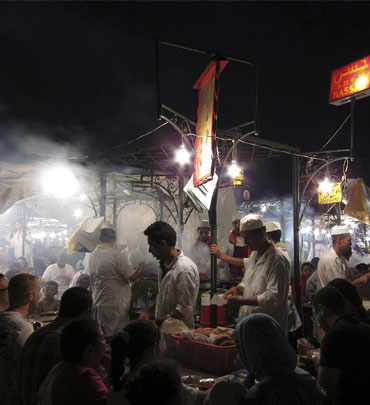
And then there is Marrakesh with its incredibly busy and colourful market square (Djemma el Fna). It also has, like Fez, several imposing mosques with beautiful gardens.
The gardens of Morocco offer pleasure throughout the year but in the hottest months of June-August, they offer an incredible relief. A major attraction in Marrakesh is the Majorelle Garden with its cacti, lily ponds and an Islamic museum.
Created by French painter Jacques Majorelle in the 1920s, the garden had fallen into bad times for many years. But when the Algeria-born French master Yves Saint Laurent bought it several decades ago, it began a new life. Yves Saint Laurent, who spent a couple of millions of dollars reviving it, also chose it as his final resting place.
While Majorelle Garden is an oasis in the ever busy and very modern city of Marrakesh, the Djemma el Fna is the biggest draw.
Made famous in the writings of American masters like Paul Bowles who spoke and wrote at length about the pleasure of getting lost in the mazes of the el Fna (and the souk of Fez), it draws hordes of visitors every day not only from across the world but also from other Moroccan cities.
"Can you ever get bored here?" a French tourist asks loudly, in French first and then in English.
The square is filled with snake charmers, monkey circuses, fortune tellers, ice cream vendors, story-tellers, will-writers and musicians.
Over three dozen restaurants serve, in the middle of the chaos and high octane atmosphere, a variety of traditional food including snails in garlicky broth (which the French love), fried sardines, couscous with lamb, sheep heads - and fresh orange juice.
Djemma el Fna is really the heart of Marrakesh, everyone will tell you.
It is possibly the biggest tourist draw in the country. "People forget that even without foreign tourists, it will [still] be very busy," an Australian who has made Morocco his home for several years says.
It is a large central square in the old city (Medina) and during the day it's a good place to grab a freshly-squeezed orange juice, dates and pastries. But after eight in the evening and into the early hours of the morning, it becomes a spectacle, an open-air entertainment park, and a gourmet eating paradise for less than $3 per person.
It is also surrounded by a dozen cafes overlooking the square, great places to step away from the jostling the crowds below.
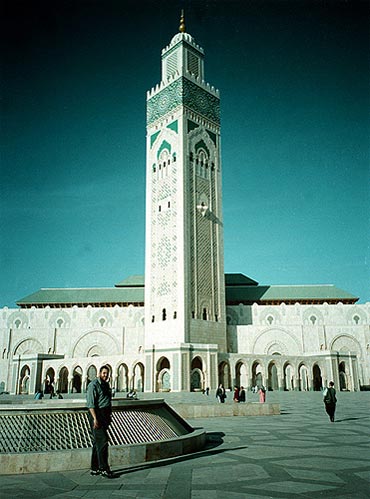
The square is also a home to hordes of con-artists. "I love India," says a young woman singing the song from the Subhash Ghai movie Pardes. She is about to put a snake on my neck and her companion is about to take a picture. But many people warn me to boldly say NO.
"If you don't," says a police officer who shoos her away, "they will offer you the Polaroid picture and demand as much as $20." Many tourists get intimidated and cave in, he says.
You have seen the mosques, markets, beaches, ancient ruins (going back to the Roman times 2,000 years ago) and have had a relaxing time at the spas, what else could you see?
If you have time to go south, about eight hours by bus from Casablanca, you will encounter awesome gorges; the best-known and most spectacular is the cleave in the high Atlas range called Toda Gorge.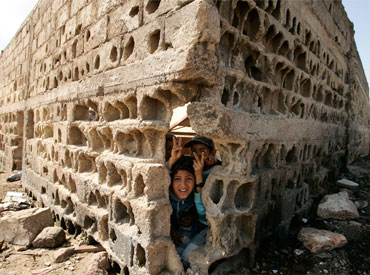
The sights and sounds of Morocco become even more memorable through encounters with its people. Though English is spoken by a tiny minority, there is no shortage of warmth and friendliness throughout the land. And soon you realize that many of the problems Moroccans have, many of their aspirations and hopes are not very different from your own.
At the end of our sojourn, a tour guide starts talking about his family. His wife and three children are at her parents' home in Agadir, a popular sea resort. They will return after a month.
"I called my wife yesterday asking her how to use the wash machine," he says with a small smile. "I have never learned to use it. You know what she said? 'Use your hands, too complicated to explain it.'"
He has been married for 12 years. Times were better then, he said. "I could afford to give her a decent dowry." In many Arab countries, men have to pay the dowry. He gave her family, he remembers, a dozen hens, two sheep dogs, two moderately priced rugs and a mini refrigerator.
"I understand from your films in India women have to give the dowry," he says with a small laugh. "When I get angry with my wife, I tell her that I will marry three Indian women."
What does she say to him?
"She says, 'Good riddance'," he says with a bigger smile. "Like in Indian films we fight with each other but we also love each other a lot. Like in your films."